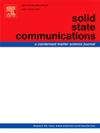Thermal nanoindentation of (3C) silicon carbide 3C-SiC using molecular dynamics simulation
IF 2.4
4区 物理与天体物理
Q3 PHYSICS, CONDENSED MATTER
引用次数: 0
Abstract
Using molecular dynamics (MD) simulations, we investigated the effect of temperature on the nanoscale deformation behavior and mechanical properties of single-crystal (3C) silicon carbide (3C-SiC) (010) plane under nanoindentation. The simulation results showed that the atomic displacement and stress increased with increasing temperature. Thus, the nucleation and propagation of dislocations in the main slip systems were promoted to intensify the plastic deformation of the 3C-SiC crystal. The formation and propagation of prismatic loops was discussed. It was found that the hardness and Young's modulus decreased with increasing temperature. The increasing temperature also contributed to the enhancement of the local phase transition from zinc blende (B3) crystal structure to wurtzite (B4) crystal structure and very obvious amorphization in the indentation region. This work can enrich the atomic-level understanding of the effect of temperature on the mechanical response of monocrystalline 3C-SiC when subjected to external loads.
用分子动力学模拟(3C)碳化硅3C- sic的热纳米压痕
利用分子动力学(MD)模拟研究了温度对纳米压痕下单晶(3C)碳化硅(3C- sic)(010)平面纳米尺度变形行为和力学性能的影响。模拟结果表明,原子位移和应力随温度的升高而增大。因此,促进了主滑移体系中位错的形核和扩展,从而加剧了3C-SiC晶体的塑性变形。讨论了棱柱环的形成和传播。硬度和杨氏模量随温度的升高而降低。温度的升高也促进了由闪锌矿(B3)晶体结构向纤锌矿(B4)晶体结构的局部相变增强,压痕区非晶化非常明显。这项工作可以丰富原子水平上对温度对单晶3C-SiC受外部载荷时力学响应影响的理解。
本文章由计算机程序翻译,如有差异,请以英文原文为准。
求助全文
约1分钟内获得全文
求助全文
来源期刊

Solid State Communications
物理-物理:凝聚态物理
CiteScore
3.40
自引率
4.80%
发文量
287
审稿时长
51 days
期刊介绍:
Solid State Communications is an international medium for the publication of short communications and original research articles on significant developments in condensed matter science, giving scientists immediate access to important, recently completed work. The journal publishes original experimental and theoretical research on the physical and chemical properties of solids and other condensed systems and also on their preparation. The submission of manuscripts reporting research on the basic physics of materials science and devices, as well as of state-of-the-art microstructures and nanostructures, is encouraged.
A coherent quantitative treatment emphasizing new physics is expected rather than a simple accumulation of experimental data. Consistent with these aims, the short communications should be kept concise and short, usually not longer than six printed pages. The number of figures and tables should also be kept to a minimum. Solid State Communications now also welcomes original research articles without length restrictions.
The Fast-Track section of Solid State Communications is the venue for very rapid publication of short communications on significant developments in condensed matter science. The goal is to offer the broad condensed matter community quick and immediate access to publish recently completed papers in research areas that are rapidly evolving and in which there are developments with great potential impact.
 求助内容:
求助内容: 应助结果提醒方式:
应助结果提醒方式:


